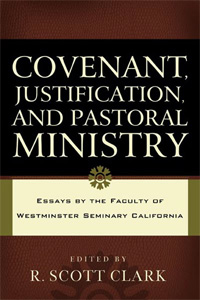Apropos of recent discussions on the HB P&R Publishing has released CJPM as an e-book on iTunes for $9.99. The hardcopy is still available for $18.99 at the bookstore.
history of covenant theology
Olevianus On Moses As A Legal Covenant
For the [Mosiac] covenant was a legal covenant solemnly agreed, by which the people were obligated to present, by their own strength, perfect obedience to the Law (Matthew 22). Since the Law is the eternal rule of righteousness in the divine mind . . . Continue reading →
The Law Might Be Called A Covenant Of Works
The Law—considered as a national covenant, by which their continued possession of the land of Canaan, and of all their privileges under the Theocracy, was left to depend on their external obedience to it,— might be called a national Covenant of Works, . . . Continue reading →
The History Of Covenant Theology
Until recently, it was widely held that covenant theology was created in the middle of the seventeenth century by theologians such as Johannes Cocceius (1609–1669). In fact, covenant theology is nothing more or less than the theology of the Bible. It is . . . Continue reading →
Heidelcast 50: Making Some Sense Of The Republication Debate Pt 3: With Chris Gordon
Beginning at least in the 1560s, it was non-controversial for Reformed theologians to teach that God, before the fall, entered into a legal, probationary covenant with Adam, who was the representative of the whole human race, the condition of which was perfect . . . Continue reading →
Three Things Dispensational Apologists Should Stop Saying
There are varieties of Dispensationalism, e.g., classic (Darby, Scofield), modified (Chafer, Ryrie), and progressive (Bock, Blaising). To be sure there are varieties of covenant theology, e.g., classic e.g., that taught in the classical period that taught the covenant of redemption (pactum salutis), . . . Continue reading →
Vos: Whoever Has Historical Sense Can See The Covenant Of Works In The Earlier Reformed Writers
This overview is sufficient to show how the older writings can manifest the covenant doctrine in Reformed theology. But, one might perhaps say, that only applies to the covenant of grace. These historical data cannot prove that the covenant of works belonged . . . Continue reading →
Office Hours: Introducing Johannes Cocceius On Covenant Theology In English
For most of his long career, Johannes Cocceius (1603–69) taught Old Testament, biblical theology, theology, and philology in the Netherlands. He was arguably one of the most important and influential Reformed theologians of the 17th century and his influence continues to be . . . Continue reading →
Turretin On The Covenant Of Nature (12)
IV. This double covenant is proposed to us in Scripture: of nature and of grace; of works and of faith; legal and evangelical. The foundation of this distinction rests both on the different relation (σχέσει) of God contracting (who can be considered . . . Continue reading →
Witsius: The Decalogue Reflects The Dual Character Of the Mosaic Covenant
XIV. The law, which God in this manner published, consists of ten words or commandments, Exod. 34:28, Deut. 4:13. Wherefore the Greeks also called it δεκάλογος, the decalogue. Moreover the contents of those ten words are various. 1st, There is the prescription . . . Continue reading →
John Owen Was Not A Baptist (Part 2)
Obs. I. Believers under the new testament have lost nothing, no privilege that was enjoyed by them under the old. Many things they have gained, and those of unspeakable excellency, but they have lost nothing at all. Whatever they had of privilege . . . Continue reading →
Office Hours: Introducing Rollock’s Commentary On Ephesians
One of the goals of Office Hours is to let the listener know about the work of the faculty in the classroom and in the study. For more than a decade I have had the privilege of editing a series of English . . . Continue reading →
With The Guilt, Grace, Gratitude Podcast On The Development Of Reformed Covenant Theology In The Reformation
Contrary to what some Dispensational writers have claimed the Christian church, in the post-apostolic period, has always taught covenant theology. The Epistle of Barnabas (c. AD 120) wrote a fairly mature covenantal explanation of the history of redemption, the unity of the . . . Continue reading →
The Covenant Before The Covenants
Those not well read in sixteenth- and seventeenth-century Reformed theology might be forgiven their ignorance of the covenant of redemption or for concluding that it is an arcane doctrine long abandoned. Continue reading →






